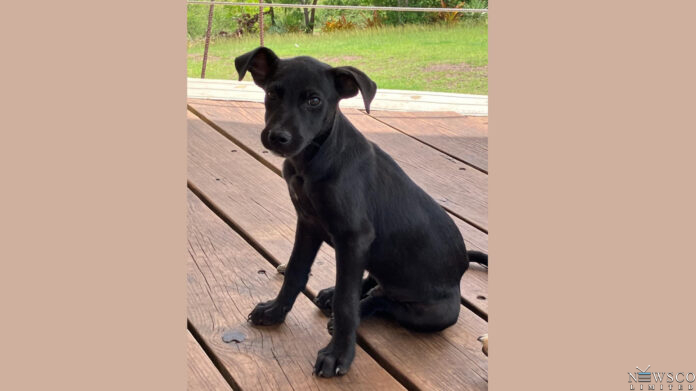By Samantha Simon
Antigua’s animal welfare community is reeling after the tragic poisoning deaths of three dogs, including a puppy named Flambouyant that was scheduled to travel to a new home in Wisconsin on Saturday.
The dogs were under the care of Caroline Pierce, a resident of the Liberta area who fosters stray dogs for rehabilitation and adoption.
On Saturday morning, Pierce awoke to the horrific discovery of all but one of her dogs dead, apparently from poisoning.
Pierce’s two dogs were found dead on her gallery, while the puppy was found dead under her car.
Three-month-old Flambouyant — slated to start a new life in the US that very day — was among the victims.
“It takes a lot of effort, energy to look after the dogs. You put a lot of love and time and effort into making them well,” said Joy Farrell, a representative of Dogs and Cats of Antigua that had rescued the puppy from the streets of St John’s.
“To find them dead the next morning when you wake up and go out, it’s a horrible shock. [Pierce] was totally devastated.”
According to Farrell, dog poisoning has plagued Antigua for over 40 years, often perpetrated by goat owners aiming to protect their livestock from stray dogs.
However, Pierce reported there had not been goats in her area for over a year. Another motive is to remove dogs in order to facilitate burglary.
Farrell asserted that the identities of many dog poisoners are known to the community, yet a lack of serious law enforcement and prosecution allows the abuse to continue with impunity.
She called on the government to make an example through heavy fines or imprisonment, insisting such a message is necessary to curb the cruel practice.
“We’re living in the 21st century. This kind of stuff should not be acceptable anywhere,” Farrell said.
“We’re judged on how we treat the weakest segments of our society, and in this case, the most vulnerable segments are animals that can’t protect themselves. It’s up to us, the few civilised among us who respect other life, to do something about it and say no more, this cannot keep happening.”
The group Dogs and Cats of Antigua plans to continue pressing the government for stronger action against dog poisoning.
In the meantime, they mourn the senseless loss of innocent lives and the dashing of a hopeful puppy’s chance at a better future.
What to do if your dog is poisoned
Fact Sheet: Steps to Help a Poisoned Dog
1. Act quickly: Time is of the essence when treating a poisoned dog. The sooner you intervene, the better the chances of survival.
2. Remove the poison: If possible, remove any remaining poison from the dog’s reach to prevent further ingestion.
3. Call your veterinarian: Immediately contact your veterinarian or a pet poison helpline for guidance on how to proceed.
4. Identify the poison: If you know what poisoned your dog, inform your veterinarian. This information can help determine the best course of treatment.
5. Induce vomiting: If advised by your veterinarian, induce vomiting to remove the poison from the dog’s stomach. Hydrogen peroxide (3%) can be used – give 1 teaspoon per 5 pounds of body weight, up to 3 tablespoons.
6. Administer activated charcoal: If recommended by your vet, give your dog activated charcoal, which can help absorb the poison. Mix the charcoal with water and give it orally.
7. Give supportive care: Keep your dog warm and comfortable. If they are not vomiting, offer small amounts of water to keep them hydrated.
8. Monitor vital signs: Check your dog’s breathing, heart rate, and temperature. If any of these become abnormal, inform your veterinarian immediately.
9. Seek veterinary care: Transport your dog to the veterinarian as soon as possible for professional treatment. They may administer IV fluids, medications, or other treatments as necessary.
10. Prevent future incidents: Keep all potentially toxic substances out of reach of your pets. Properly store and dispose of hazardous materials to prevent accidental ingestion.
Remember, prevention is the best cure.
Always keep a close eye on your dog and their environment to avoid potential poisoning incidents.
Animals that have been poisoned experience immense pain, distress, and organ damage that ultimately overwhelms the body if untreated.
Symptoms may include vomiting, diarrhea, seizures, difficulty breathing, and loss of consciousness before death.
Depending on the poison used, this process can take several agonizing minutes up to 3-5 hours, but the results are usually immediate and frankly permanent.
If you suspect your dog has been poisoned, do not hesitate to seek veterinary care immediately.

